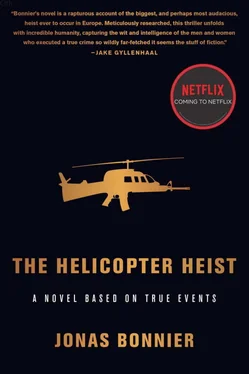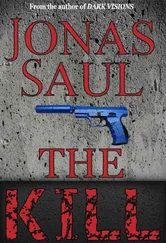—
On Tuesdays, Claude Tavernier liked to go to the middle bar at Sturehof, waiting for midnight and the start of his shift. The middle bar was small and intimate, at once both a passageway and a cozy corner. He liked to exchange a few comradely words with the hardworking barman and then just stand around with his cold beer, watching all the beautiful people come and go in the mirror. In the taxi on the way to work, he would then chew some menthol gum so that no one would notice that he stunk of alcohol and decide that he had a drinking problem.
There was no real need for him to take a taxi out to the suburbs. Tavernier had bought a used Nissan a year earlier, a car he liked more than he cared to admit. But since the number of parking spots the company had out in Västberga was limited, Tavernier would have to wait for someone else to quit or die before he managed to get ahold of one.
He sighs, pays the bill and heads out onto Stureplan. He finds an empty TaxiKurir, the company he feels loyal to for some unclear reason, and then jumps in the backseat.
“Västberga Allé,” he says.
The driver nods and steps on the gas.
—
When Claude Tavernier climbs out of the taxi outside the G4S cash depot on the night of September 22, it’s ten to twelve. And there, just as he is making his way into the building, he loses all confidence for a very brief moment.
It’s something that happens a few times a week.
It’s like when you’re on a plane and the weather is good, and then it suddenly, unexpectedly, drops a few feet due to turbulence. Or like when you’re sprawled over the toilet and have been throwing up and up and up, so much that it feels like there’s nothing left to throw up, but still you know that the next stomach cramp is on the way.
I’m no one, he has time to think. I can’t be in charge of a load of people. I can’t make decisions for others.
Claude Tavernier takes a deep breath. He fills his lungs with the cool night air, raises his face to the sky and then the moment passes.
He’s the night manager for Counting on the sixth floor of G4S once again.
A young career man.
He finds his ID card in his pocket and holds it up to Valter Jansson, the security guard in Reception that night. Tavernier and Jansson have worked plenty of nights together in Västberga; they feel comfortable with one another.
11:52 p.m.
On the top floor of one of Stockholm’s few skyscrapers, a building where the newsrooms of Sweden’s biggest morning paper, Dagens Nyheter, and the country’s second-biggest evening paper, Expressen, were once based, is an internal dining room available only to the businesses in the building. Turning the room into a commercial restaurant has been discussed on a number of occasions; the views are spectacular and it’s not like there has been a lack of interested restaurateurs. But one of Dagens Nyheter ’s historic boardrooms is on the other side of the wall to the kitchen, and though it’s been decades since the paper moved downstairs, the top floor is still thought of as its executive floor. And, naturally, it doesn’t want any outsiders up there.
It’s approaching twelve when the kitchen staff leave the restaurant kitchen on the twenty-third floor that evening. Food has been cooked and served to a working group from Expressen . Top-level management must have been present, because less alcohol has been consumed than usual, and the evening was quickly wound up. The kitchen and service staff are glad for the early finish, and they laugh on their way down to street level on Rålambsvägen.
No one notices that someone who has been working on the cold buffet all night is missing from the cramped elevator. If they had, they might just assume that he had already left or that he was sorting out one last thing in the kitchen before heading home.
Both assumptions would have been wrong.
The missing man waits on the twenty-third floor until he sees on the display that the elevator carrying his colleagues has reached ground level. He holds back until he’s sure that none of the elevators are coming back up again. Then he takes out his electronic pass and opens the door to the stairwell. He climbs the stairs to the roof and opens the door, which is locked from the inside. Before he steps out into the night, he pushes a cork into the doorway so that the door won’t lock behind him.
During a shift a few days earlier, he had gone up to the roof to take a leak and hidden a pair of night-vision goggles behind one of the chimney stacks. This time, he’s carrying a black gym bag from SATS, inside it a warm sweater, a thermos full of coffee, four bananas and a bar of Marabou chocolate. It’s going to be a long night, and he’ll need the extra energy.
The man from the cold buffet breathes in the cool night air and looks out over the beautiful capital. Right below him, Riddarfjärden glitters in the glow of the streetlamps, the water curling like an autostrada from Rålambshovsparken to city hall. In the other direction, to the west, the Traneberg Bridge rises up across the narrow sound, and to the south, he can see red and white dots of light moving along the winding bridges of the Essingeleden highway.
It’s because of the view that the man is on the roof. From the highest building in Marieberg, he’ll be able to see anyone approaching Västberga from the air. He’ll be able to blow their cover in good time, whether they’re on the way from Berga or Uppsala.
He takes out a brand-new cell phone and dials the only number saved in the contact list.
Sami Farhan answers.
“Team Four. I’m in position,” the man from the cold buffet says.
11:55 p.m.
Ezra Ray is sitting in a gray 1999 Volvo V70, with all the registration and tax documents in the glove compartment. He doesn’t know who owns the car, but he assumes it belongs to the scrapyard in Lidingö where he picked it up an hour or so earlier. He drives across Lidingö Bridge and decides not to take the route through Lill-Jansskogen Park. It’s the middle of the night, and he imagines that the risk of being pulled over by the police will be greater if he chooses a dark forest road. Instead, he takes Valhallavägen, wide and well lit, full of heavy trucks delivering or picking up goods from the harbors beyond Gärdet.
Ezra Ray doesn’t know exactly what is happening tonight, but by putting together the pieces he has been involved in, the drawings he stole from the town planning office and the ladders he bought from Bauhaus, he could work some of it out. Studying the items beneath the blankets in the roomy trunk of the Volvo, he could probably work out the rest. There’s a circular saw and some mailbags. Ropes and frame charges. Detonators, cables and explosives. Face masks, body armor and headlamps. Two crowbars, an enormous sledgehammer and a smaller toolbox. The ladders. The longer of the two is twelve feet long when folded, Ezra had to push it between the front seats and let it rest on the dashboard. He still couldn’t close the trunk lid properly.
But he doesn’t put the pieces together, he doesn’t draw any conclusions. If he never thinks it, it’ll be easier to deny knowledge later. If he has to deny anything.
—
It’s not the ladders preventing him from closing the trunk that will be his biggest problem if the police pull him over. If they’ve set up a drunk-driving checkpoint by Roslagstull, if the car’s registration number is in a database of people who haven’t paid parking fines, or the traffic police happen to stop him, it’s all over. Possession of explosives is an offense in Sweden. Ezra knows that he’s aware of only a fraction of the planning that must have gone into this evening. He knows how this type of project is built on hopes and dreams.
Читать дальше












